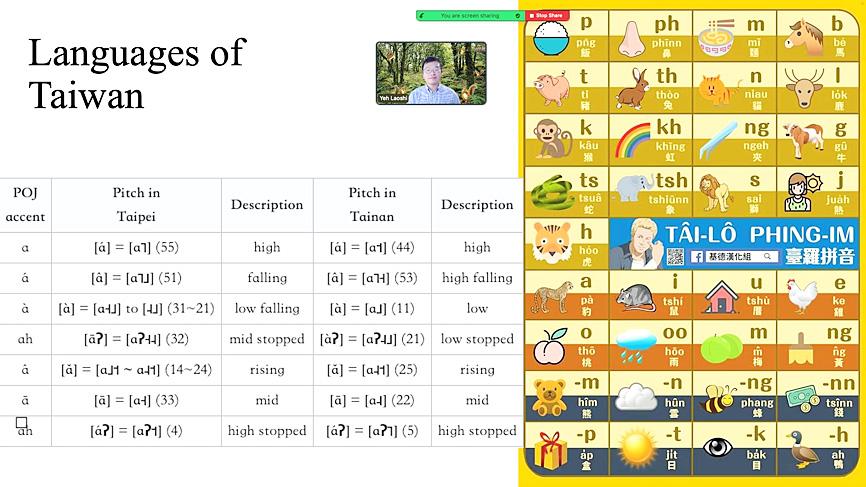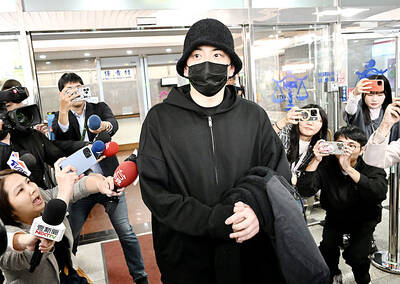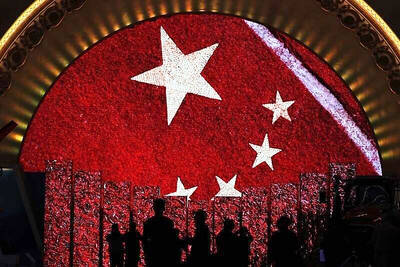A course on the languages and cultures of Taiwan at the University of California, Los Angeles (UCLA), has been taken by nearly 100 students in the past two years.
UCLA launched the Taiwan Studies Lectureship in 2014 and renewed it for another five years in 2020, said Pan Hui-chen (潘惠珍), education section secretary at the Ministry of Education’s Department of International and Cross-strait Education.
The program is supported by the Ministry of Education and organized by the UCLA Asia Pacific Center, Pan said.

Photo courtesy of the Ministry of Education
It encourages professors to develop Taiwan studies courses, invites visiting academics from Taiwan to be guest lecturers at UCLA, holds public events, makes library acquisitions, and provides research grants for faculty and graduate students to conduct research in Taiwan, the program’s Web site says.
The course “Languages and Cultures of Taiwan,” which was planned and designed by UCLA graduate Tsai Lin-chin (蔡林縉), was first offered in January 2020.
Students who enroll in the course are required to have taken Mandarin classes for at least a year.
The course compares Hoklo (also known as Taiwanese) with the Minnan languages used in Chinese communities in Southeast Asia.
Through pop music, Taiwanese opera, puppetry, media and documentaries in Hoklo, the students learn about Taiwanese languages and culture in the hope of showcasing the nation’s diversity.
The course has been taught by Yeh Hsin-hung (葉信鴻), a lecturer at Santa Clara University, since the fall semester last year.
Yeh uses the concept of a “flipped classroom,” asking students to go through assigned materials and movies in advance and share their thoughts in class.
UCLA undergraduate Jao Li-ching (饒麗晴) said she only realized after taking the course the impact Japanese colonization has had on Taiwan and the nation’s many indigenous languages.

The National Immigration Agency (NIA) said yesterday that it will revoke the dependent-based residence permit of a Chinese social media influencer who reportedly “openly advocated for [China’s] unification through military force” with Taiwan. The Chinese national, identified by her surname Liu (劉), will have her residence permit revoked in accordance with Article 14 of the “Measures for the permission of family- based residence, long-term residence and settlement of people from the Mainland Area in the Taiwan Area,” the NIA said in a news release. The agency explained it received reports that Liu made “unifying Taiwan through military force” statements on her online

A magnitude 5.7 earthquake struck off Taitung County at 1:09pm today, the Central Weather Administration (CWA) said. The hypocenter was 53km northeast of Taitung County Hall at a depth of 12.5km, CWA data showed. The intensity of the quake, which gauges the actual effect of a seismic event, measured 4 in Taitung County and Hualien County on Taiwan's seven-tier intensity scale, the data showed. The quake had an intensity of 3 in Nantou County, Chiayi County, Yunlin County, Kaohsiung and Tainan, the data showed. There were no immediate reports of damage following the quake.

Actor Darren Wang (王大陸) is to begin his one-year alternative military service tomorrow amid ongoing legal issues, the Ministry of the Interior said yesterday. Wang, who last month was released on bail of NT$150,000 (US$4,561) as he faces charges of allegedly attempting to evade military service and forging documents, has been ordered to report to Taipei Railway Station at 9am tomorrow, the Alternative Military Service Training and Management Center said. The 33-year-old would join about 1,300 other conscripts in the 263rd cohort of general alternative service for training at the Chenggong Ling camp in Taichung, a center official told reporters. Wang would first

A BETRAYAL? It is none of the ministry’s business if those entertainers love China, but ‘you cannot agree to wipe out your own country,’ the MAC minister said Taiwanese entertainers in China would have their Taiwanese citizenship revoked if they are holding Chinese citizenship, Mainland Affairs Council (MAC) Minister Chiu Chui-cheng (邱垂正) said. Several Taiwanese entertainers, including Patty Hou (侯佩岑) and Ouyang Nana (歐陽娜娜), earlier this month on their Weibo (微博) accounts shared a picture saying that Taiwan would be “returned” to China, with tags such as “Taiwan, Province of China” or “Adhere to the ‘one China’ principle.” The MAC would investigate whether those Taiwanese entertainers have Chinese IDs and added that it would revoke their Taiwanese citizenship if they did, Chiu told the Chinese-language Liberty Times (sister paper